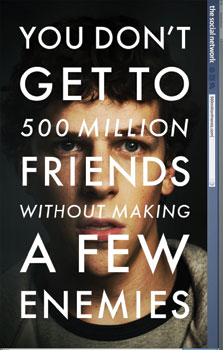Facebook is THE Social Network
Anthony Nguyen
The Signal

One-in-14 human beings on this planet has a personal Facebook account. When a living species pays that kind of allegiance to a social network, one can’t help but think – Social Contract?
At this year’s New York Film Festival, movie director David Fincher rhetorically asked, “How many people in this room have Final Cut Pro?” in reference to the ease of making films today. Yes, the ability to make a feature-length movie has been made much more accessible in the last decade, but not just anyone can make a movie of such caliber as Finch’s “The Social Network.”
Adapted liberally from Ben Mezrich’s 2009 nonfiction(-ish) book “The Accidental Billionaires,” the film is an overdramatized telling of the creation and ensuing (pun intended) tensions surrounding Internet juggernaut/way-of-life Facebook.com.
Fincher orchestrates a concerto of brilliant writing (Alan Sorkin), wondrous acting (Jesse Eisenberg, Andrew Garfield, etc.) and affecting score (Trent Reznor) into a story of how an invention, intended to bring friends together, ultimately tears its creators apart.
In doing so, Fincher reasserts his idiosyncratic style and impeccable instincts.
One of the most intriguing aspects of watching “The Social Network” is the knowledge that we, the overwhelming majority of the audience, have had, and continue to have, such a heavy hand in shaping its very subject.
Prior to its current ubiquity in so many aspects of our culture, however, the website was born from the idea of exclusivity.
Hatched at Harvard University by Mark Zuckerburg, his dormmates Chris Hughes and Dustin Moskocitz and best friend Eduardo Saverin in 2004, Facebook was originally only available to students with an ‘@harvard.edu’ e-mail. It soon branched out to college campuses nationwide in the same tuition-paying fashion.
“I remember joining Facebook because I had a psu.edu (Penn State) e-mail in 2005,” said Andrew Robinson, UHCL social work senior. “It was this hotbed of student activity that was a great alternative to the tacky MySpace.”
“All my friends at the University of Houston main campus were talking about joining Facebook in 2005,” said Omar Sanjak, UHCL graduate student in engineering.
As the effects of reality set in, Facebook became open to the public in 2006.
The general consensus with students and Facebook users was that the more content-driven format of Facebook was preferred over the waning, increasingly gaudy MySpace. Whoever created glitter art should be charged with treason.
“Because of Facebook, we are able to get the most out of our social lives,” Sanjak said. “Heck, I’ve even discovered family members I never knew I had through Facebook.”
Talk about a family reunion.
“Sure, Facebook gets a bad wrap for its ‘frivolity’ and its administrative policies,” Robinson said. “But it continues to be an invaluable way of staying in touch with friends and family. It’s hard to imagine life without it now.”
The official UHCL Facebook page started status updating in June of 2009.
“We really started seeing the value of being able to interact with students online and providing them with the information in the format that they want to receive information,” said Haley Hedderick, coordinator of web communications. “It’s quick and we can get information out rapidly to them. It’s something they’re gonna check on a pretty regular basis.”
Eighty-five percent of U.S. college students use Facebook. Hence, approximately 6,800 UHCL students regularly frequent this vortex of chronicled visages.
There’s a scene toward the end of “The Social Network” where a law associate sees Zuckerberg on his laptop and asks what he is doing. After informing her that he is checking to see how things are going in Bosnia, she replies “Bosnia – they don’t have roads, but they have Facebook.”
How astute.
LIKE.


Comments are closed, but trackbacks and pingbacks are open.